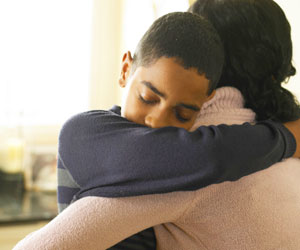Hugs Help Protect Against Colds by Boosting Social Support
We’re told to wash our hands, get plenty of rest, and avoid public coughers and sneezers in order to keep the common cold at bay, but new research suggests another line of defense: hugs.
A team of researchers, led by Sheldon Cohen, the Robert E. Doherty University Professor of Psychology in the Dietrich College of Humanities and Social Sciences at Carnegie Mellon University, tested whether hugs act as a form of social support, protecting stressed people from getting sick. They found that greater social support and more frequent hugs protected people from the increased susceptibility to infection associated with being stressed and resulted in less severe illness symptoms.
The findings are published in Psychological Science, a journal of the Association for Psychological Science.
 Cohen and his team chose to study hugging as an example of social support because hugs are typically a marker of having a more intimate and close relationship with another person.
Cohen and his team chose to study hugging as an example of social support because hugs are typically a marker of having a more intimate and close relationship with another person.
“We know that people experiencing ongoing conflicts with others are less able to fight off cold viruses. We also know that people who report having social support are partly protected from the effects of stress on psychological states, such as depression and anxiety,” said Cohen. “We tested whether perceptions of social support are equally effective in protecting us from stress-induced susceptibility to infection and also whether receiving hugs might partially account for those feelings of support and themselves protect a person against infection.”
In 404 healthy adults, perceived support was assessed by a questionnaire, and frequencies of interpersonal conflicts and receiving hugs were derived from telephone interviews conducted on 14 consecutive evenings. Then, the participants were intentionally exposed to a common cold virus and monitored in quarantine to assess infection and signs of illness
The results showed that perceived social support reduced the risk of infection associated with experiencing conflicts. Hugs were responsible for one-third of the protective effect of social support. Among infected participants, greater perceived social support and more frequent hugs both resulted in less severe illness symptoms whether or not they experienced conflicts.
“This suggests that being hugged by a trusted person may act as an effective means of conveying support and that increasing the frequency of hugs might be an effective means of reducing the deleterious effects of stress,” Cohen said. “The apparent protective effect of hugs may be attributable to the physical contact itself or to hugging being a behavioral indicator of support and intimacy.”
Cohen added, “Either way, those who receive more hugs are somewhat more protected from infection.”
In addition to Cohen, the research team included Carnegie Mellon’s Denise Janicki-Deverts, University of Virginia Health Sciences Center’s Ronald B. Turner and University of Pittsburgh School of Medicine’s William J. Doyle.
The National Institutes of Health’s National Center for Complementary and Alternative Medicine, National Institute of Allergy and Infectious Diseases and the National Heart, Lung and Blood Institute funded this research.





APS regularly opens certain online articles for discussion on our website. Effective February 2021, you must be a logged-in APS member to post comments. By posting a comment, you agree to our Community Guidelines and the display of your profile information, including your name and affiliation. Any opinions, findings, conclusions, or recommendations present in article comments are those of the writers and do not necessarily reflect the views of APS or the article’s author. For more information, please see our Community Guidelines.
Please login with your APS account to comment.